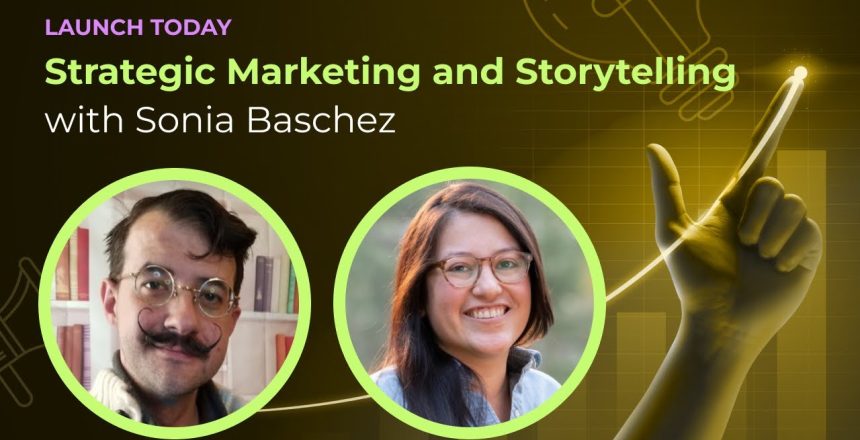Many founders struggle with marketing. They’re experts in their field, but marketing feels like a black box. How do you position your product? What messages resonate with customers? Where should you focus your limited time and resources? These questions keep founders up at night, especially when investors are demanding growth.
The cost of poor marketing is steep. Startups burn through cash on ineffective ads. They waste months building features nobody wants. Worst of all, they miss out on customers who need their product but never hear about it.
This article is your lifeline. Sonia Bashel, a fractional CMO and marketing expert, recently shared invaluable insights on the Launch Today podcast. This article breaks down her key points and how you can apply them to your startup.
The Power of Positioning
Positioning is the foundation of your marketing efforts. Sonia emphasizes, “Figure out how to position your product or company in the market. What are your differentiators?” This process starts with your founder story. Why did you create this product or service? What problem did you see that needed solving?
Your positioning should highlight what sets you apart from competitors. Are you bringing tech solutions to legacy industries? Are you competing against outdated methods like spreadsheets and PDFs? Your unique value proposition lies in these differentiators.
A common mistake founders make is focusing too much on their product features. Instead, your messaging should center on your customers’ problems and how you solve them. Don’t tell potential clients about you; tell them about themselves and how their lives will improve with your solution.
Crafting a Clear and Compelling Message
Sonia’s experience on Hillary Clinton’s presidential campaign taught her the importance of honing a message to drive action. In the startup world, your ultimate goal is converting prospects into paying customers. To achieve this, you must understand what your customers want and show how your product delivers it.
Your message should convince people to take specific actions. Whether it’s signing up for a demo, starting a free trial, or making a purchase, every piece of content should guide potential customers toward these goals. This requires a deep understanding of your audience’s needs, pain points, and motivations.
Building a Strong Social Media Presence
Forget about corporate social media accounts. Sonia advises founders to use their personal profiles instead. “People want to see that you’re a real human being going through it as you’re building something new,” she notes. Share your journey, including both successes and failures. This authenticity builds trust and connection with your audience.
The concept of “building in public” has gained traction in recent years. By sharing your startup’s progress, challenges, and learnings, you create a narrative that potential customers and investors can follow and engage with. This transparency not only attracts attention but also builds a community around your brand.
Assessing and Optimizing Your Marketing Efforts
As a fractional CMO, Sonia quickly assesses a startup’s marketing efforts. Her process involves reviewing positioning and messaging, analyzing current marketing channels, and identifying what’s working and what’s not. This systematic approach allows for rapid improvements and better resource allocation.
Many startups overlook basic yet effective marketing tactics. These include setting up welcome email series, creating re-engagement campaigns for stagnant signups, and implementing referral programs for happy customers. These fundamentals often yield significant results with minimal investment.
Rethinking Customer Acquisition Strategies
Traditional demo offers are losing effectiveness. Sonia suggests a more personal approach: have the founder reach out directly, offering a quick call to discuss new features. This personal touch can significantly increase engagement and conversion rates.
Some founders proudly claim they’ve grown without marketing. Sonia debunks this myth, pointing out that marketing encompasses everything from the language used to describe your product to the steps in your conversion funnel. If you’ve grown your startup, you’ve done marketing – you just might not have been systematic about it.
Focusing on Conversion, Not Just Acquisition
Many companies fall into the trap of prioritizing user acquisition over conversion. Sonia warns against this, noting that a large user base means little if they’re not converting to paid accounts. The solution is to focus on bringing in the right type of customer and optimizing your conversion funnel.
Lead nurturing through email campaigns and content marketing plays a crucial role in moving prospects through your sales funnel. By providing value and addressing potential customers’ needs at each stage, you increase the likelihood of conversion.
The Importance of Customer Feedback
Talking to your customers is non-negotiable, especially in the early stages. Sonia insists, “Most customers, especially in the early stages, are willing to tell you exactly what they think about what you’re building.” This feedback is invaluable for understanding what customers truly want, avoiding unnecessary features, and improving your product.
Customer feedback should directly inform your product roadmap. By aligning your development efforts with customer needs, you increase the chances of creating a product that resonates with your target market and drives conversions.
Conclusion
Marketing is not just about ads or landing pages. It’s about understanding your customers deeply and clearly communicating how you solve their problems. By focusing on strong positioning, clear messaging, authentic social media presence, and customer feedback, you’ll build a solid foundation for reaching your first million in revenue. Remember, the key to successful marketing lies in consistency, authenticity, and a relentless focus on providing value to your customers.



